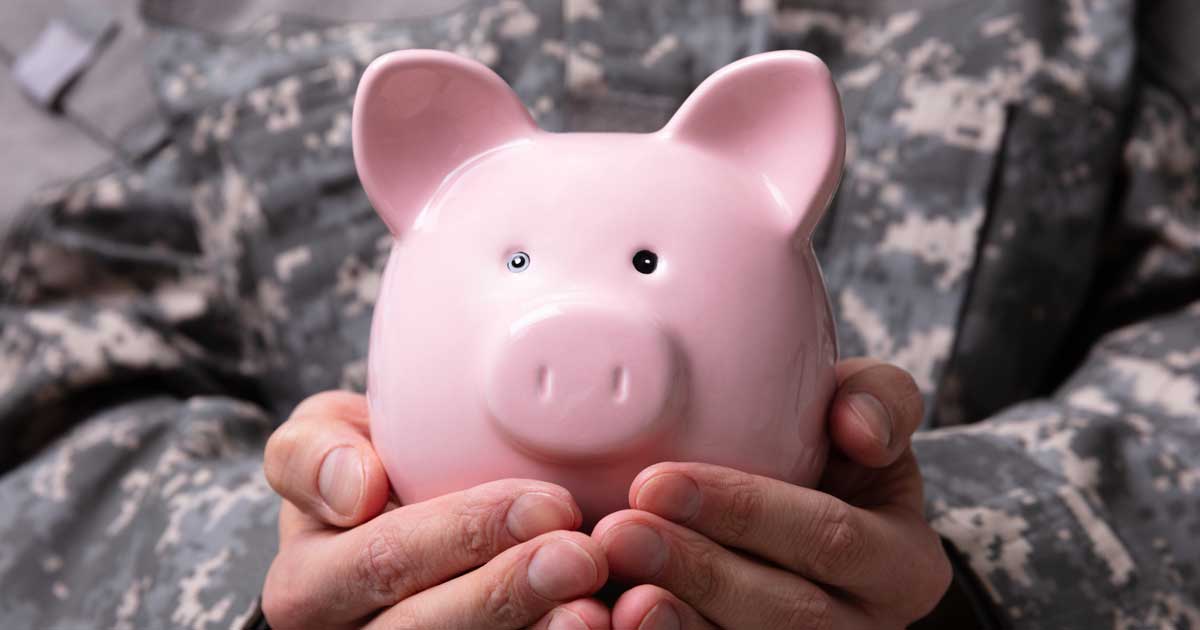Military to Civilian Financial Transition
Tips to help navigate finances post military service

Transitioning from the military to civilian life has its own unique challenges. Besides the obvious changes in lifestyle and day-to-day experiences, navigating personal finances should be prioritized to help avoid added stress during this transitional period. Studies show finances are consistently identified as one of the biggest issues for military veterans and their spouses. However, with careful planning and a bit of knowledge, there are ways to help make that military to civilian transition a more financially secure one.
Create a spending plan. The first step for anyone in managing their finances is to see where their money is going each month. A spending plan will help organize your finances and keep track of your expenses in the ways that work best for you. You can start by using our free spending plan.
Utilize your military benefits. You may still be eligible for education, disability and healthcare benefits after leaving the military through the Department of Veteran Affairs (VA) which will help cover some expenses. You can also receive support through the transition assistance program (TAP) of your branch. Be sure to familiarize yourself with the laws designed to protect you from predatory lending and discrimination.
Pay off debt. If you have any outstanding debt, such as credit card debt or loans, it's important to pay it off as soon as possible. Debt can have a negative impact on your credit score and can make it difficult to achieve your financial goals. Consider prioritizing high-interest debt first and make extra payments whenever you can.
Build an emergency fund. Unexpected expenses such as car or home repairs can pop up at any time. Having an emergency fund can help you weather these financial storms without relying on credit cards or loans.
Invest for the future. In addition to saving for emergencies, it's important to invest for the future. Consider setting up a retirement account, such as an individual retirement account (IRA) or a 401(k), as soon as possible. Investing early can help you take advantage of compound interest and grow your savings over time.
Seek help if needed. There are many resources available to help you navigate your finances as a civilian. Outside of the financial counseling services the VA offers, our Member Relationship Specialists at our Financial Health Centers can personalize your spending plan and recommend products and services based on your needs.
The transition from military to civilian life can be challenging, but with the right financial strategies in place you can achieve your financial goals and thrive in your new life. Our mission is to help you succeed. Make an appointment at your nearest Financial Health Center to get started.
Create a spending plan. The first step for anyone in managing their finances is to see where their money is going each month. A spending plan will help organize your finances and keep track of your expenses in the ways that work best for you. You can start by using our free spending plan.
Utilize your military benefits. You may still be eligible for education, disability and healthcare benefits after leaving the military through the Department of Veteran Affairs (VA) which will help cover some expenses. You can also receive support through the transition assistance program (TAP) of your branch. Be sure to familiarize yourself with the laws designed to protect you from predatory lending and discrimination.
Pay off debt. If you have any outstanding debt, such as credit card debt or loans, it's important to pay it off as soon as possible. Debt can have a negative impact on your credit score and can make it difficult to achieve your financial goals. Consider prioritizing high-interest debt first and make extra payments whenever you can.
Build an emergency fund. Unexpected expenses such as car or home repairs can pop up at any time. Having an emergency fund can help you weather these financial storms without relying on credit cards or loans.
Invest for the future. In addition to saving for emergencies, it's important to invest for the future. Consider setting up a retirement account, such as an individual retirement account (IRA) or a 401(k), as soon as possible. Investing early can help you take advantage of compound interest and grow your savings over time.
Seek help if needed. There are many resources available to help you navigate your finances as a civilian. Outside of the financial counseling services the VA offers, our Member Relationship Specialists at our Financial Health Centers can personalize your spending plan and recommend products and services based on your needs.
The transition from military to civilian life can be challenging, but with the right financial strategies in place you can achieve your financial goals and thrive in your new life. Our mission is to help you succeed. Make an appointment at your nearest Financial Health Center to get started.



